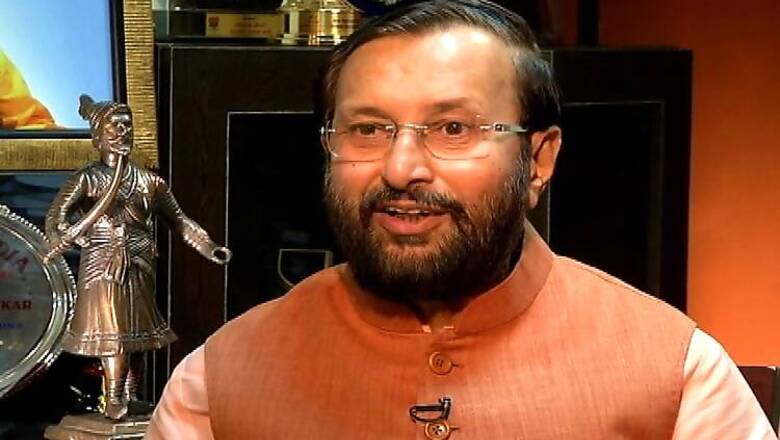
views
New Delhi: Ahead of the Paris climate change summit, India on Monday said technology must provided to all countries without barriers even as it blamed the "historical cumulative" emissions of the last 150 years for the rise in global temperature at present.
Environment Minister Prakash Javadekar said that India is not part of the problem but will be part of the solutions and hoped that a solution will be reached during the Paris climate summit.
He said sharing of technology at affordable cost and compensating the companies through Green Climate Fund (GCF) are ideas which India has put on the table which the world is discussing.
"Technology must come to all those who want to use to make the earth better without barriers," Javadekar said at a national seminar in the run up to the Conference of Parties (CoP21) in Paris.
Noting that the Intended Nationally Determined Contributions (INDC) can be achieved with partnership of all stakeholders, Javadekar said that once the needed technological cooperation is in place, INDCs can undoubtedly be achieved and India can go even beyond that.
"In the last few years, we (India) decided to offer IPR-free low-cost medicines to fight HIV AIDS. But this climate change is a much more serious threat than HIV AIDS."
"Then why to profit from disaster? Sharing of IPR technology at affordable cost and compensating the companies through GCF are ideas we have put on the table and the world is discussing. I think from Paris, some solution will come," he said.
He said "India is not part of the problem. If today the world is experiencing 0.8 degrees celcius temperature rise, it's the historical cumulative emissions of 150 years which is the cause of it. In that, we (India) are just 3 per cent. "So, we are not part of the problem. Our Prime Minister says though we are not part of the problem, we will be part of the solution and we will lead by example," he said.
Noting that India's INDC was appreciated world over, Javadekar said that the NGO alliance which otherwise used to single out India for everything has come out with a conclusion that the developing world has done much better through their INDCs and the developed world now should walk the talk and up their ambitious as they have done less.
Observing that India wants clean air, water, environment, energy and more green which is reflected in its INDC, Javadekar said that there are many issues.
"Now there are issues. Not only finance. The World Bank and many other institutes are coming out with new conditionalities. Today, my per capita coal consumption is one-fifth of the US. Even in 2030, I (India) will not be overtaking that. The US and China have decided that 2030, China will peak.... "...India will never reach there. Thats India's commitment. That's India's stage of development. You can't now project me (India) as villian.
Therefore, technology becomes very important. Technology has to be free," he said.
Referring to the example of the Indo-US civil nuclear deal when Manmohan Singh was Prime Minister in 2008, Javadekar said that BJP was told that the deal will not only be about nuclear energy but it would be access to high-end research.
"We were told this is not about nuclear energy, this is about access to high-end research in US. But that did not come about practically. That is the issue. Therefore, we want technology for all sectors," Javadekar said.
Javadekar also said that concept of carbon pricing is more about "paap-mukti" (penance) and advocated green crediting system instead.
"Carbon pricing, our Prime Minister says is a function of market and it fell because we diluted it so much. The concept of carbon pricing is of 'paap mukti'. You emit carbon, you pay for it and then you are free from responsibility.
"We must promote green credit. Through all these new concepts, we will achieve our INDCs and we can do better," Javadekar said.
The TERI-CBS (Council for Business Sustainability), an independent platform for corporate leaders to address issues related to sustainable development, organized the seminar for businesses to deliberate on topics related to climate change that cut across industries--energy, waste, water and renewable energy.
Javadekar also hailed the the convergence of all corporates and called the abridged version of TERI Business Council's vision document as the "Corporate Environment Responsibility Document."


















Comments
0 comment